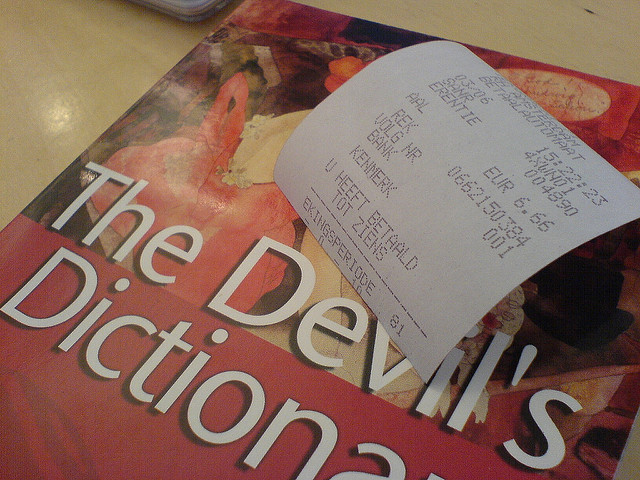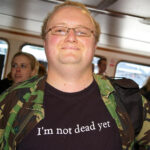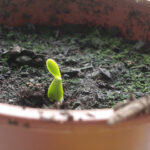Beware of the person of one book. – Thomas Aquinas

Beware of the person who knows only this; it is a sarcastic list of misinformation disguised as a dictionary.
What does that mean?
These words have been used in many different ways, from a warning regarding the narrow nature of such a person (ie not broadly educated).
But in the original sense, it is a warning about one who has devoted their life to the study of one thing, to the exclusion of all else.
This person is formidable in their depth of knowledge, having never been distracted by other books. This is a worthy pursuit, provided you have the right book.
However, even today, when knowledge is so plentiful and easily sourced, many are the other kind of one-book person. If you study in depth, make sure you get the right book.
Why is it important to beware of single source people?
As mentioned above, there are two kinds of people who focus on a single source of information, and one must beware of each. Those who have chosen well in their book, they will be some of the most formidable opponents to argue with on that topic. That can be most enlightening, if your mind is open, and very frustrating if not.
The other kind of person, those who have not chosen well in their book or topic, they are best avoided. Why? Because they will be convinced of what is not true, and they will consider themselves an expert. Nothing you say will convince them otherwise. In short, you will simply be wasting your breath.
Sometimes, when cornered by the second kind of one-book person, it’s best to yield to good sense, and concede their point, as you will most certainly never convince them that you are right or that they are wrong. Nothing will ever do that, and it is not a good use of your time to so endeavor.
Fortunately, few people are of either type, so unless you live in the rare air of a research zone (either scientific or academic), you are unlikely to run into the first kind of one-book person. And, in this day of instant internet searches, the second kind of one-book person is getting rarer and rarer, as they are slowly being shown the error of their ways.
Where can I apply this in my life?
Since most of us don’t run into either kind very often, let’s quickly cover the two main kinds, and then consider if we wish to become a one-book person.
The first kind of one-book person is most easily addressed by asking questions that are of genuine interest to you. If the topic isn’t of any interest, most people will respond to a bland “that’s interesting, but what about…” and a change of subject fairly well. If not, you can always treat them as the second kind of one-book person.
When dealing with the second kind, the easiest way to deal with them (politely) is to first figure out how long you think you can tolerate them, and then start changing the subject every time they take a breath. If necessary, spotting a friend (even an imaginary one) across the room can be useful, as can emergency trips to the bathroom. In extreme cases, you can always fake a medical incident.
Obviously we don’t want to become the second kind of one-book person. But how do we do that? The simplest way I have seen is to make sure you do some research into the topic in general. Don’t just grab the most popular book, or the one with the most interesting cover. Actually check a few out and get a feel for the topic.
Unless you are planning on doing your own original research, you will have to find reputable people to get your information from. Examine both their arguments and the counter arguments. Try to find out the most likely truth. Avoid being overly emotional, as that tends to cloud the judgement and lead people to favor the second kind of person.
Once you have found the general answer, it is time to find your one book. What this usually means is first finding your author. That is most often the person with the most experience in the field, the best educated, most thoroughly documented or best at persuading others in the topic you have chosen.
However, as time has changed, so has even science. Be prepared to recognize when your arguments have been trumped by new facts and experimental data, and be ready to find a new book, lest you transition from the first kind of one-book person to the second kind of one-book person, right?
Life is full of interesting people. Some know interesting things. Others are just as certain they know things, but do not. You may be a member of one of these groups, or even both (in different subject areas).
Beware of when you start to drift towards being the second kind of person. It is important, if not for your sake, for the sake of your friends and family.
From: Twitter, @philo_quotes
confirmed at : Never definitively sourced, but attributed from the 1700s…
photo by Michell Zappa







I think the kind of person who is convinced by one book/argument, is, frequently of the same stamp as those who subscribe to conspiracy theories. Rather than accepting that the world is a complex place and most things/events stem from numerous causes, the conspiracy theorist blames/attributes everyting (usually bad) to one cause. For example the neo-Nazi is convinced by the ravings of Hitler in Mein Kampf that there exists a Jewish conspiracy, while the simplistic Communist reads the works of Marx and believes that Capitalism is doomed/can not be fundamentally reformed. I believe it is rarely (if ever) sensible to be convinced by the arguments of one book or school. Kevin
Thanks for stopping by and for taking the time to leave a comment.
I would agree that many of the people who find their truth solely (or at least primarily) through one book have chosen the wrong book. But there are people who have found a worthy book, and can either explain it with great ease and relevance, or defend it with great vigor and clarity.
Your comment emphasizes the pitfalls of choosing poorly, and why I spent some time warning against choosing a book carelessly or with too much emotion.